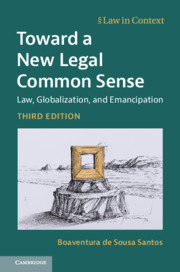Book contents
- Toward a New Legal Common Sense
- The Law in Context Series
- Toward a New Legal Common Sense
- Copyright page
- Dedication
- Contents
- Preface to the Third Edition
- Preface to the Second Edition
- Acknowledgements
- 1 The Tension between Regulation and Emancipation in Western Modernity and Its Demise
- 2 Toward an Oppositional Postmodern Understanding of Law
- 3 Legal Plurality and the Time-Spaces of Law: The Local, the National, and the Global
- 4 The Law of the Oppressed: The Construction and Reproduction of Legality in Pasargada
- 5 Globalization, Nation-States, and the Legal Field: From Legal Diaspora to Legal Ecumenism?
- 6 Law and Democracy: The Global Reform of Courts
- 7 On Modes of Production of Social Law and Social Power
- 8 Law: A Map of Misreading
- 9 Can Law Be Emancipatory?
- Postface as Disquietude
- Bibliography
- Index of Names
- Index of Subjects
1 - The Tension between Regulation and Emancipation in Western Modernity and Its Demise
Published online by Cambridge University Press: 08 October 2020
- Toward a New Legal Common Sense
- The Law in Context Series
- Toward a New Legal Common Sense
- Copyright page
- Dedication
- Contents
- Preface to the Third Edition
- Preface to the Second Edition
- Acknowledgements
- 1 The Tension between Regulation and Emancipation in Western Modernity and Its Demise
- 2 Toward an Oppositional Postmodern Understanding of Law
- 3 Legal Plurality and the Time-Spaces of Law: The Local, the National, and the Global
- 4 The Law of the Oppressed: The Construction and Reproduction of Legality in Pasargada
- 5 Globalization, Nation-States, and the Legal Field: From Legal Diaspora to Legal Ecumenism?
- 6 Law and Democracy: The Global Reform of Courts
- 7 On Modes of Production of Social Law and Social Power
- 8 Law: A Map of Misreading
- 9 Can Law Be Emancipatory?
- Postface as Disquietude
- Bibliography
- Index of Names
- Index of Subjects
Summary
We find ourselves in a paradigmatic transition which we may designate as a postmodern transition, and to account for its emancipatory potential adequately we need an appropriate postmodern theory that I call theory of oppositional postmodernism. According to this theory, it is possible and necessary to think of social regulation and emancipation beyond the limits imposed by the paradigm of modernity. To accomplish it, an oppositional postmodern theory of science and an oppositional postmodern theory of law are called for. This stance takes the promises of modernity very seriously, be they liberty, equality and fraternity. It submits them to a radical critique that allows us to understand the perversities concerning the fulfillment of some of the promises and the impossibility of fulfilling others and it allows us to identify the emancipatory potential that the promises keep intact but that can only be realized within postmodern social, cultural, political, epistemological, and theoretical boundaries. The promises of modernity have become problems for which there seems to be no solution at all. In the meantime, the conditions that brought about the crisis of modernity have not yet become the conditions to overcome the crisis beyond modernity. Hence the complexity of our transitional period: we are facing modern problems for which there are no modern solutions. The search for a postmodern solution is what I call oppositional postmodernism.
Keywords
- Type
- Chapter
- Information
- Toward a New Legal Common SenseLaw, Globalization, and Emancipation, pp. 1 - 23Publisher: Cambridge University PressPrint publication year: 2020

